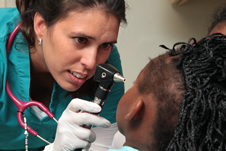By Doug Carlson
TALLAHASSEE, Fla. — The Florida State University College of Medicine and the Lee Memorial Health System Board of Directors today announced plans to create a family medicine residency program in Fort Myers.
The program, expected to produce six new family practice physicians a year when at full capacity, will be the first allopathic residency program south of Tampa/St. Petersburg along Florida’s southwest coast. Among the fastest growing regions in the state, the area is in need of more physicians to take care of a population that grew by more than 40 percent in Lee County between 2000 and 2010.
“This is an exciting first for Southwest Florida,” said Richard Akin, chairman of the board of Lee Memorial Health System. “Bringing a medical residency program to our community will improve the delivery of health care to our residents, and the opportunity to partner with Florida State University’s medical school enhances our community’s reputation as well.”
The family medicine residency program will be based at Lee Memorial Hospital with the Florida State University College of Medicine as its institutional sponsor. The program could begin taking applications from prospective residents as early as 2012 and admit its first class in July 2013.
Medical school graduates are required to complete residency training in their chosen specialty in order to gain board certification and become an independently practicing physician. Numerous studies have shown that most physicians end up practicing near where they completed residency training.
At present, Florida ranks 43rd nationally in the number of residents per 100,000 population, despite being the fourth-most-populous state in the country.
“In reaching our 10th anniversary with full enrollment and a great track record of success, we are now seeing the need to have more residency programs around the state to train our graduates and provide Florida communities with the doctors they most need,” said John P. Fogarty, M.D., dean of the College of Medicine, a board-certified family physician and chair of the Florida Council of Medical School Deans.
“One of the top priorities of my fellow medical school deans here in Florida is to support increasing the number of residency positions in Florida,” Fogarty said.
To date, 450 physicians have graduated from the FSU College of Medicine, which first accepted students in 2001. Family medicine and internal medicine are the top two residency program choices for College of Medicine alumni.
In 2011, 17 percent of Florida State’s 114 medical school graduates entered family medicine residency programs, with more than half of those heading out of state for residency training.
Nationally, 8.4 percent of all graduating U.S. medical students chose family medicine in 2011.
“Even though the number of our graduates to complete residency training at this point is relatively small, there is evidence that when they train in Florida it keeps them in Florida, especially in the communities where their training takes place,” said Alma Littles, M.D., senior associate dean for medical education and academic affairs at the FSU College of Medicine and a former Florida Family Physician of the Year.
“For example, all seven College of Medicine alumni who completed a family medicine residency program in Tallahassee in June now are practicing in North Florida,” Littles said.
Of the 47 FSU College of Medicine graduates to complete graduate medical education in Florida, 42 (89 percent) are now practicing in Florida.
Funding for graduate medical education comes from a variety of sources, primarily from the federal government through Medicare. The number of federally funded residency training slots was capped in 1997 by the Balanced Budget Act. Florida has seen dramatic population increases in the interim, but its available number of residency slots has held steady.
“As the baby boomer population ages, we are going to need more primary care physicians in our community,” said Scott Nygaard, M.D., chief medical officer of physician services for Lee Memorial Health System. “We are creating this training program to address that need, and we are making the necessary financial commitment to create a pipeline of primary care physicians who will make Southwest Florida their home.”
The residency program will be the fourth for the FSU College of Medicine, which also sponsors programs in pediatrics and obstetrics-gynecology (in Pensacola) and internal medicine (in Tallahassee).
“The College of Medicine commends Lee Memorial Health System for recognizing the return on investment to the patient community by training more primary care physicians, despite limitations in federal funding,” said Christopher Mulrooney, assistant dean for graduate medical education and chief operating officer of the College of Medicine faculty practice plan.
“The reality is that health care cannot be provided to those who need it without enough providers to do the job,” Mulrooney said. “Lee Memorial understands that reality.”
###
CONTACT: Doug Carlson, FSU College of Medicine
(850) 694-3735; doug.carlson@med.fsu.edu
-or-
Mary Briggs, Lee Memorial Health System
(239) 454-8765; mary.briggs@leememorial.org



